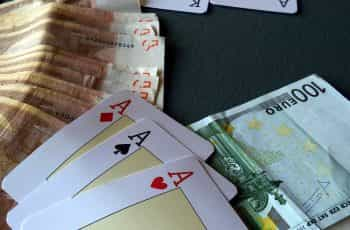KSA Calls Out Lack of Self-Exclusion in Regulations
The regulator of the Dutch gambling market, the KSA, has spoken out against the decision from the government to omit self-exclusion precautions in its regulations. The regulatory authority believes the regulations, aimed at the online gambling market, would benefit consumers in the Netherlands. These criticisms were published in the KSA’s report on the issues it will face when overseeing the new, regulated online gambling market.

The KSA has criticized some of the government’s plans to legislate for the regulated market in Holland. The lack of a short-term self-exclusion scheme has prompted backlash from the regulator. ©besteonlinecasinos/Pixabay
The report was designed to cast a critical eye over the gambling sector as a whole, to get a better grasp of its failures and inefficiencies. The KSA was also aiming to communicate its thoughts on how best to protect the consumers in the country and counteract problematic gambling behaviors.
One area that came under particular scrutiny in the report was the national gambling self-exclusion register that will be implemented upon the launch of the market. The KSA has called out the government’s omission of a short-term self-exclusion period.
Under the proposed regulations, consumers in the Netherlands will only be able to sign up to the centralized register that would exclude them from gambling for a six-month period at a minimum. The KSA has taken issue with this, stating that for many players who struggle with periodic lapses of self-control, a 24-hour cooling-off period may be more apt.
Such players may be more prone to gamble on their pay-day, according to the KSA and, as such, a temporary block on gambling may help them see more clearly and control their spending habits when they are more likely to gamble.
How to Tackle Problem Gambling
In its report, the KSA also included its ideas on how best to tackle the issue of dangerous gambling activity in the regulated market. The regulator sided with the government in its estimation that the prohibition of online gambling in Holland had not been successful.
The KSA has suggested that one way to improve the rates of problem gambling in the sector could be to offer financial rewards and punishments for operators in the market. To better control problem gambling, information on the risks of gambling must be effectively disseminated to players and accounts must be effectively monitored for suspicious activity. These incentives could improve these measures.
The KSA has issued a warning that any financial penalties the government may introduce should not be based on the offending operator as in a polluter pays model. The authority has warned that if such a system were to be implemented, recreational players would be disproportionately impacted. This is because costs would likely be passed on to players whilst at the same time not doing enough to discourage dangerous gambling.
According to the regulator, implementing a blanket tax for each player that varies depending on the amount of money deposited or wagered would not have the desired effect. This is because in relation to the overall numbers of players that are gambling, a very small number display risky behaviors. This would, therefore, disproportionately affect the majority of players who are not at risk.
Deposit limits are a widely used tactic across many online gambling markets globally that aim to prevent players from excessive gambling and keep track of their funds. The KSA has supported the implementation of such a strategy but has emphasized the necessity that these are set by players on an individual level.
The KSA has warned against mandatory deposit limits and against them being set by the operators themselves. That is not to say that the KSA doesn’t think they should be encouraged, however. The regulator has said in no uncertain terms that operators should suggest such limits to each customer.
Issues With Each Vertical
In the report, the KSA took a methodical approach when looking at the potential dangers of each vertical that will be present in the regulated online gambling market that is due to be launched in 2021.
For example, the regulator took a detailed look at the risks associated with playing the lottery. The authority concluded that this form of gambling was relatively low-risk when compared to other forms of gambling. According to the KSA, it is less likely that a player will become addicted to such a game, even when they are an at-risk individual.
Lotteries do not exacerbate the addictive tendencies of players as much as other forms of gambling because of the long period that is present between buying a ticket and receiving a prize. This break means that there is no real opportunity for players to continue playing after purchasing a ticket.
This is not to say that lotteries are risk-free. The KSA has warned that some parts of this form of gambling, such as large jackpots and the wide availability of tickets from a huge variety of sources can be dangerous for at-risk players. Things such as scratch cards pose a much greater risk of addiction, however.
The KSA has also pushed for further regulation of this vertical in its report. This legislation would aim to improve the transparency in this industry, prevent misleading advertising, and would help remove confusing subscription services that players can become trapped in. Additionally, the regulator has suggested that fairness in the lottery draws could be improved.
Included in the report was a section estimating the relative risks of the sports betting vertical. This form of gambling was described by the KSA as having a substantially larger risk-factor to other verticals. Sports betting was seen as a significant risk for average players and, according to the KSA, poses a greater risk than online casino games.
The problem that the KSA saw with sports betting is that players will often overestimate their level of skill when it comes to predicting the outcome of a sporting event. This can in turn fuel problematic gambling activity and can lead to gambling addiction more easily than other forms of gambling.
In an attempt to offset the high risk of this vertical, the KSA has suggested that the operators offering such services should pay a tax that would support charities that fund sports in the Netherlands. The KSA will not take any part in implementing such a levy, however, and will leave this decision to the politicians in government.
The report also analyzed the risks involved with online casino games. This form of gambling also poses a high risk to players due to the highly addictive nature of some of the games that are offered. With online casino games, a small number of players are responsible for the vast majority of the money that is wagered, which, according to the KSA is indicative of its risk.
The high turnover of these games as well as the quick pay-outs that are offered can make this a very addictive way to gamble. The KSA has suggested that many of the regulations that will be implemented when the online gambling market opens will help to offset some of the risks that are present with these types of gambling.
In the full report, the KSA underwent a full breakdown of the dangers and benefits of each gambling vertical that will become the norm when the new, regulated market is launched next year.



